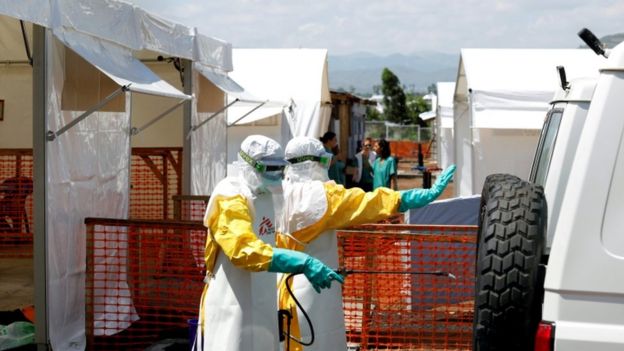Ebola drugs show ‘90% survival rate’ in breakthrough trial
Ebola may soon be a “preventable and treatable” disease after a trial of two drugs showed significantly improved survival rates, scientists have said.
Four drugs were trialled on patients in the Democratic Republic of Congo, where there is a major outbreak of the virus.
More than 90% of infected people can survive if treated early with the most effective drugs, the research showed.
The drugs will now be used to treat all patients with the disease in DR Congo, according to health officials.
The US National Institute of Allergy and Infectious Diseases (NIAID), which co-sponsored the trial, said the results are “very good news” for the fight against Ebola.
The drugs, named REGN-EB3 and mAb114, work by attacking the Ebola virus with antibodies, neutralising its impact on human cells.
They are the “first drugs that, in a scientifically sound study, have clearly shown a significant diminution in mortality” for Ebola patients, said Dr Anthony Fauci, director of NIAID.
REGN-EB3 and mAb114 were developed using antibodies harvested from survivors of Ebola, which has killed more than 1,800 people in DR Congo in the past year.
Two other treatments, called ZMapp and Remdesivir, have been dropped from trials as they were found to be less effective.
What were the results of the trial?
The trial, conducted by an international research group co-ordinated by the World Health Organization (WHO), began in November last year.
Since then, four experimental drugs have been tested on around 700 patients, with the preliminary results from the first 499 now known.

Of the patients given the two more effective drugs, 29% on REGN-EB3 and 34% on mAb114 died, NIAID said.
In contrast, 49% on ZMapp and 53% on Remdesivir died in the study, the agency said.
The survival rate among patients with low levels of the virus in their blood was as high as 94% when they were given REGN-EB3, and 89% when on mAb114, the agency said.
The findings mean health authorities can “stress to people that more than 90% of people survive” if they are treated early, said Sabue Mulangu, an infectious-disease researcher who worked on the trial.
What impact could the drugs have?
Hailing the success of the study, Jeremy Farrar, director of the Wellcome Trust global health charity, said the treatments would “undoubtedly save lives”.
The findings, Mr Farrar said, indicate scientists are getting closer to turning Ebola into a “preventable and treatable” disease.
“We won’t ever get rid of Ebola but we should be able to stop these outbreaks from turning into major national and regional epidemics,” he added.
A sense that Ebola is incurable, paired with widespread mistrust of medical workers in the DR Congo, has hampered efforts to stop the spread of the disease.
It is hoped that the effectiveness of the drugs, made by US-based pharmaceutical firms, will make patients feel “more comfortable about seeking care early”, said Dr Fauci.
But the best way to end the outbreak, he added, is “with a good vaccine”. A vaccine is a type of medicine that improves immunity to a particular disease, as a preventative measure.
The World Health Organization (WHO) say vaccines developed to protect against Ebola, which are allowed for “compassionate use” before official licensing, have proven highly effective.


